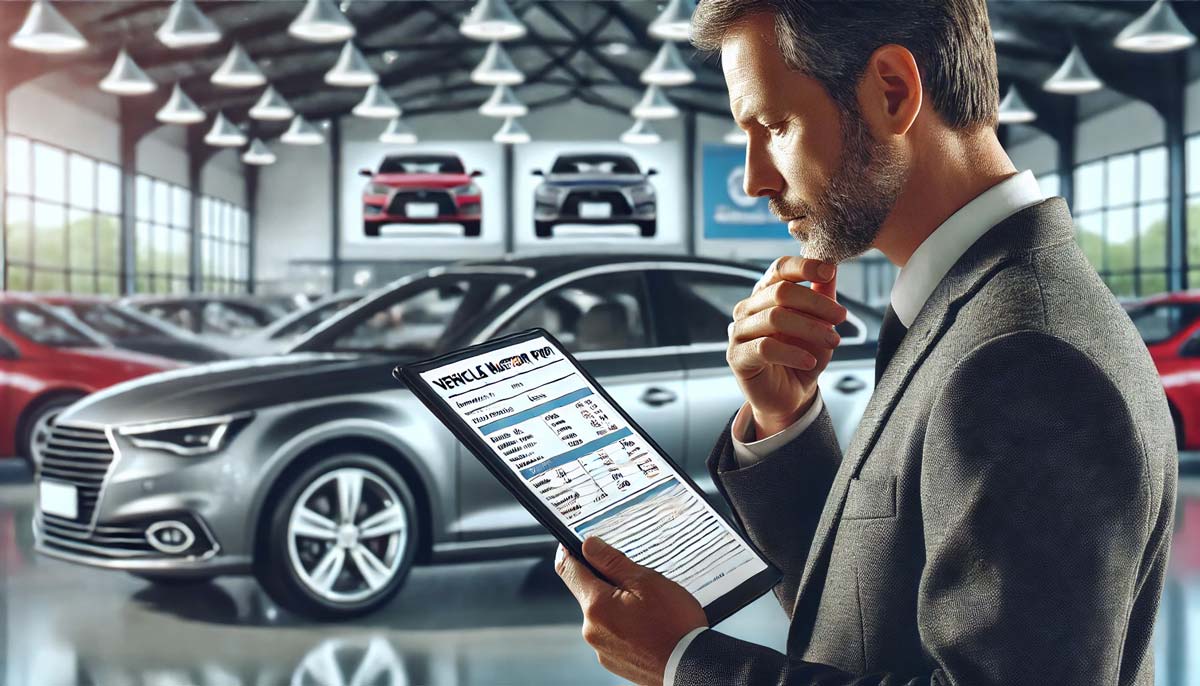 https://auction.ridesafely.com/images/2018/10/banner-truck-auctions-for-everyone.jpg
865
1440
RideSafely
/images/2025/01/ridesafely-logo.svg
RideSafely2025-09-26 12:10:232025-09-26 14:53:10How to Buy Your Next Truck at an Auto Auction
https://auction.ridesafely.com/images/2018/10/banner-truck-auctions-for-everyone.jpg
865
1440
RideSafely
/images/2025/01/ridesafely-logo.svg
RideSafely2025-09-26 12:10:232025-09-26 14:53:10How to Buy Your Next Truck at an Auto AuctionPurchasing a used car involves more than just admiring its gleaming exterior or taking it for a test drive. To truly understand what you’re investing in, acquiring a vehicle history report is essential.
This article explores the vital role these reports play in ensuring you make a well-informed purchase decision.
- Accident History Insight: The report provides details of any significant accidents that might have compromised the vehicle’s structural integrity, crucial for assessing the car’s safety and value.
- Ownership History: Fewer previous owners generally increase a car’s desirability and value, making ownership history a significant factor in your buying decision.
- Mileage Verification: Checks for odometer discrepancies, protecting against fraud and ensuring the car’s value matches its actual usage.
- Salvage Titles: Identifies if the car has a salvage title, signaling extensive past damages and potential future repair costs.
- Maintenance Records: Offers insight into the car’s maintenance history, helping you budget for future expenses and assess its upkeep.
- Recall Notices: Reports any open recalls that could affect the vehicle’s safety or functionality.
- Negotiation Leverage: The comprehensive details provided allow for better price negotiations based on the car’s past issues and maintenance needs.
Unveiling the Past: The Importance of Accident History
One of the key components of a vehicle history report is the accident history section. This information is crucial as it reveals any significant accidents that might have affected the structural integrity of the vehicle. Such details not only help you understand the car’s past but also enable you to discuss any concerning points with the seller, ensuring transparency in your purchase.
The Impact of Ownership History on Car Value
The number of previous owners a car has can significantly influence its value. Typically, cars with fewer owners are more desirable because they tend to have a clearer maintenance and usage history. The vehicle history report provides detailed information about past owners, which can be a decisive factor in your buying process.
Mileage Verification: Avoiding Odometer Fraud
Another critical aspect covered by vehicle history reports is the car’s mileage. Discrepancies between the reported mileage and the odometer reading can be a red flag for odometer tampering. Verifying mileage through the vehicle history report is a safeguard against fraud and helps ensure the car’s price reflects its true value.
Salvage Titles and Hidden Damages
A vehicle history report also identifies if a car has a salvage title, indicating it was declared a total loss by insurance companies and later repaired for resale. Such vehicles might harbor hidden problems, leading to future costly repairs. Understanding this aspect can prevent you from investing in a potential money pit.
For more detailed insights on how to identify potential issues like salvage titles, which indicate significant past damage, refer to our comprehensive guide, Decoding Salvage Titles: A Buyer’s Guide to Identifying Common Damage. Understanding the intricacies of salvage titles can further enhance your ability to make informed decisions based on the vehicle history report.
Maintenance History: Planning Future Expenses
Knowing the maintenance history of a car allows you to budget for future repairs and upkeep. A well-documented service history in the vehicle history report can assure you of the car’s upkeep and alert you to potential ongoing issues that might require attention.
Uncovering Odometer Fraud and Recall Notices
Odometer fraud, a common trick to inflate a vehicle’s value by rolling back the mileage, can be spotted through inconsistencies reported in the vehicle history. Additionally, the report can inform you of any unresolved recalls that could affect the safety and functionality of the vehicle.
The Role of a Vehicle History Report in Negotiations
Armed with a comprehensive vehicle history report, you can negotiate more effectively. Understanding the car’s past allows you to discuss price adjustments based on any potential issues or maintenance needs, giving you an upper hand in negotiations.
Conclusion: A Tool for Informed Decisions
A vehicle history report is an indispensable tool for anyone looking to buy a used car. It provides a wealth of information that can influence your decision and help you purchase a car that is safe, reliable, and worth the investment. Always ensure the VIN matches the report to confirm its accuracy, enabling you to make the most informed decision possible.
By thoroughly reviewing a vehicle history report, you not only safeguard your investment but also gain peace of mind in your purchase. It’s not just about finding a car that looks good and drives well; it’s about ensuring it can reliably meet your needs without hidden costs down the line. Always prioritize obtaining and reviewing this report to ensure your next used car is a sound, transparent, and wise investment.
Vehicle History Report FAQs
What is a vehicle history report?
A vehicle history report is a document that provides detailed information about a used car’s past, including accident history, ownership, maintenance records, and more, helping potential buyers make informed decisions.
How can a vehicle history report affect the value of a used car?
A vehicle history report can reveal critical information such as previous accidents, number of owners, and maintenance history, which can significantly influence a car’s market value and desirability.
What does a salvage title mean in a vehicle history report?
A salvage title indicates that the car was deemed a total loss by insurance companies, usually due to extensive damage from an accident or natural disaster, and was later repaired for resale. Cars with salvage titles typically have lower values and may require more repairs in the future.
Why is the number of previous owners important in a vehicle history report?
Cars with fewer previous owners are generally preferred because they are likely to have a more consistent maintenance history and less wear and tear, making them more reliable investments.
What should I do if I find odometer discrepancies in the vehicle history report?
Odometer discrepancies can indicate fraud, such as odometer rollback. If discrepancies are found, it’s advisable to discuss them with the seller for clarification or reconsider the purchase to avoid potential fraud.
Can a vehicle history report show if a car has been in a flood or fire?
Yes, vehicle history reports can include information on whether a car has suffered damage from floods, fires, or other natural disasters, which can significantly impact its structural integrity and future reliability.
How does a vehicle history report help in negotiating the price of a used car?
Knowing the detailed history of the car, including any past damages or maintenance issues, can provide you with leverage to negotiate a lower price or request repairs before purchase.
Where can I obtain a vehicle history report?
Vehicle history reports can be obtained from various online services, typically by entering the car’s Vehicle Identification Number (VIN). Popular providers include CarFax and AutoCheck.
Is it worth getting a vehicle history report for every used car?
Yes, obtaining a vehicle history report is a wise decision for any used car purchase as it provides a clearer picture of the car’s past and helps avoid potential costly mistakes.
What if the vehicle history report and the seller’s information do not match?
Discrepancies between the report and the seller’s information should be addressed immediately. It’s essential to clarify any inconsistencies before proceeding with the purchase to ensure transparency and avoid potential fraud.






Leave a Reply
Want to join the discussion?Feel free to contribute!